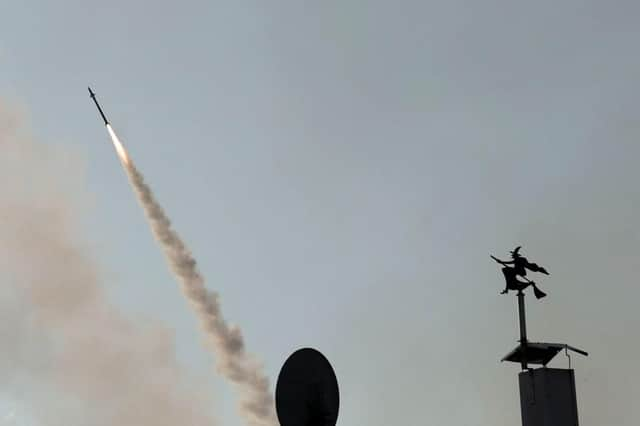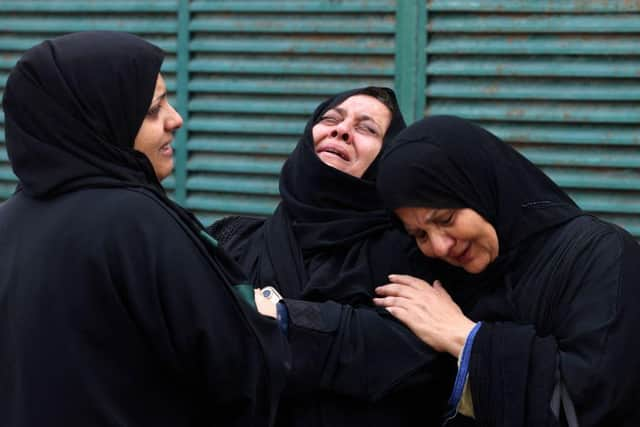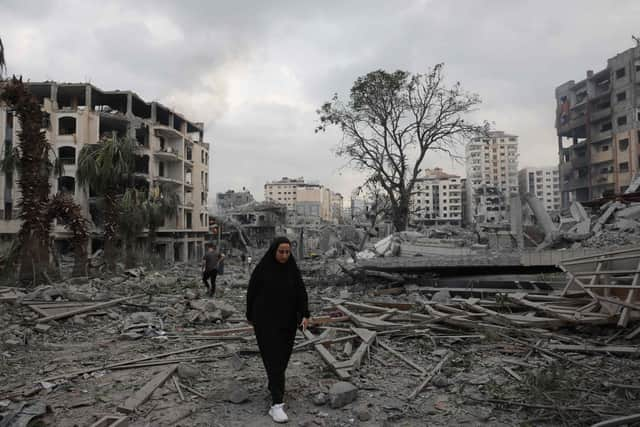Urgent calls for humanitarian corridor to deliver essential aid to Gaza as UN warns siege violates international law


Calls have intensified for a humanitarian corridor to be urgently set up to allow civilians to flee and for essential supplies to be delivered Gaza, which is under siege in the wake of the Hamas attacks on Israel.
The World Health Organisation (WHO) said critical medical supplies needed to be shipped in to treat Palestinians in the territory, which has been hit hard in retaliatory strikes by Israel after the surprise assault by Hamas which is now confirmed to have killed more than 1,000.
Advertisement
Hide AdAdvertisement
Hide AdA United Nations agency, the World Food Programme (WFP), also called for the creation of a corridor amid fears food stocks in Gaza will quickly dwindle. Two thirds of people in Gaza live below the poverty line, with many citizens relying on essential food supplies from aid organisations like WFP.


The UN warned that the blockade of Gaza and the targeting of civilian infrastructure is “prohibited under international law” and said a building belonging to its Palestinian aid arm, UNRWA, had been hit.
It comes as First Minister Humza Yousaf urged the UK Government to call for a ceasefire in Israel and Gaza to allow civilians in the territory - where his parents-in-law are currently trapped - to flee and added his voice to calls for a humanitarian corridor to be opened into Gaza to allow civilians to flee.
The area, which is home to about 2.3 million people, is ruled by Hamas, but its airspace is controlled by Israel, which also restricts activity over its border.
Mr Yousaf, whose wife Nadia El-Nakla is of Palestinian origin, said he had heard from his mother-in-law and father-in-law, who live in Dundee, after a night under bombardment in Gaza, where they were visiting an elderly relative.


“We heard from my mother-in-law this morning,” he said. “Thankfully, she survived the night, they’re safe for now, but I use that term very loosely in terms of how safe they are.”
Throughout Monday night and into Tuesday morning, his mother-in-law Elizabeth El-Nakla said, they could hear missiles and jets, causing them to be “terrified”.
“I think the worst thing is that they feel literally trapped,” he said. “They’re being told to leave… but they have nowhere to go.
Advertisement
Hide AdAdvertisement
Hide Ad“As of an hour ago, the Rafah border had been bombed and even if it was open, there’s no guarantee of safe passage travelling between where they live and the Rafah border.”
In a letter released to journalists, Mr Yousaf told foreign secretary James Cleverley: “Too many innocent people have already lost their lives as a consequence of these completely unjustifiable and illegitimate attacks by Hamas.
“However, innocent men, women and children cannot, and should not, pay the price for the actions of a terrorist group.”
He added: “As a close friend and ally of Israel, I therefore ask the UK Government to call on the government of Israel to ensure innocent civilians are protected and to put in place an immediate ceasefire to allow the safe passage of civilians through the Rafah border.
“Furthermore, it should open a humanitarian corridor into Gaza to allow supplies, including food, fuel, water and medical supplies for those civilians who are trapped, helpless and cannot leave.”
The only border not controlled by Israel, the Rafah border with Egypt, was attacked three times in 24 hours on Tuesday, the Egyptian group Sinai for Human Rights said, claiming the strikes had resulted in the closure of the crossing.
Thousands of Palestinians have already poured over the border into Egypt, which is bracing itself for a refugee crisis.
On Tuesday, Hamas told civilians living in Ashkelon, close to Gaza, to evacuate ahead of an intense rocket strike on the city. Meanwhile, Israel said it had intercepted four out of fifteen rockets fired from southern Lebanon towards Israel.
Advertisement
Hide AdAdvertisement
Hide AdHarrowing images and video footage show entire neighbourhoods in Gaza have been wiped out by Israeli attacks, which are the worst in the conflict’s 75-year history.
Israel claimed that two senior Hamas officials, Zakaria Abu Muammar and Jawad Abu Shamal, members of the Hamas political bureau, died after an air raid in Khan Yunis on Tuesday.
UN human rights chief Volker Turk highlighted laws which require warring countries to “spare the civilian population”.
"The imposition of sieges that endanger the lives of civilians by depriving them of goods essential for their survival is prohibited under international humanitarian law," Mr Turk said.
Mr Turk also pointed to Israeli air raids, which have decimated residential buildings, schools and United Nations buildings and have killed numerous civilians.
"International humanitarian law is clear: the obligation to take constant care to spare the civilian population and civilian objects remains applicable throughout the attacks," he said.
The World Health Organisation called for both sides to end the conflict.
"WHO is calling for an end to the violence...a humanitarian corridor is needed to reach people with critical medical supplies," WHO spokesman Tarik Jasarevic said.
Advertisement
Hide AdAdvertisement
Hide AdThe Hamas attacks on Israel on Saturday saw 1,000 killed and at around 150 taken hostage, with some removed into Gaza.
The International Committee of the Red Cross (ICRC) said it was ready to help reunite families and called for all hostages to be freed immediately. Both Israel and Hamas have publicly denied any hostage negotiations are taking place, although it is believed negotiations over a swap of Israeli women and children for Palestinian women and children held in Israeli jails, are ongoing, brokered by Qatar.
"Killing civilians and ill treatment are prohibited by the Geneva Conventions. In addition, the conventions demand that the wounded and sick are cared for," said ICRC president Mirjana Spoljaric.
"People detained must be treated humanely and with dignity. Hostage-taking is prohibited under international humanitarian law and hostages should be immediately released unharmed."
She said the ICRC, which has been permanently present in Israel and the Palestinian Territories since 1967, was "ready to do everything we can to help, including in our role as a neutral intermediary".
Hamas gave a warning on social media site Telegram on Tuesday afternoon, telling residents of Ashekelon – eight miles north of the border with Gaza - to leave. Similar warnings have been issued by Israel to Gazans in recent days about areas they planned to target.
The statement on Telegram said: "We give the residents of the occupied city of Ashkelon time to leave before five o'clock in the evening."
A heavy rocket attack began at 5pm.
The Israeli military said sirens sounded in Be’er Sheva and southern Israel as the attacks began. The city has previously been a target of rocket attacks, but not of the scale seen on Tuesday evening.
Comments
Want to join the conversation? Please or to comment on this article.
